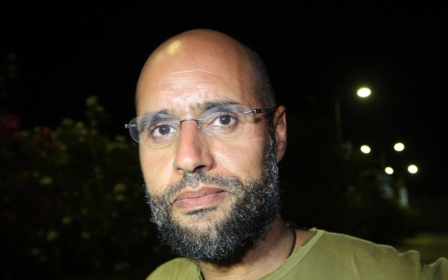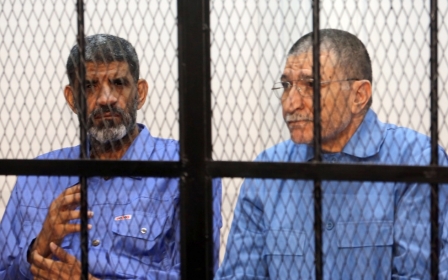Libya ex-spy boss in court with lawyers for first time

Libya's ex-intelligence chief Abdullah Senussi appeared in a Tripoli court with his lawyers for the first time Sunday, accused of abuses during the 2011 uprising that toppled dictator Moamer Gaddafi.
It was the first hearing he has attended with the four lawyers picked by his family, just one of whom is Libyan. The other three are Tunisian.
Many Libyans blame Senussi for the 1996 massacre of 1,200 inmates at Abu Salem prison in Tripoli.
The former spy chief had previously appeared without legal representation, but had been told to pick a defence team or the court would choose one for him.
Gaddafi's son and one-time heir-apparent Seif al-Islam also appeared by video link from the town of Zintan, where he has been held since his capture by rebels in November 2011.
New MEE newsletter: Jerusalem Dispatch
Sign up to get the latest insights and analysis on Israel-Palestine, alongside Turkey Unpacked and other MEE newsletters
His court-appointed lawyer was unable to attend Sunday's hearing, so the trial was adjourned to May 25 to allow him to help his client, lawyers said.
As with the previous session on April 27, just 22 of 37 former regime officials being tried for a raft of alleged abuses during the uprising that ended Gaddafi's 42-year rule were in court on Sunday.
Among those in the dock was Al-Baghdadi al-Mahmudi, Gaddafi's last prime minister. Another eight defendants appeared by video link from Misrata east of the capital.
All of the defendants are charged with murder, kidnapping, complicity in incitement to rape, plunder, sabotage, embezzlement of public funds and acts harmful to national unity.
Seif and Senussi are wanted by the International Criminal Court on charges of war crimes and crimes against humanity committed during the NATO-backed uprising.
In May last year, the ICC rejected Tripoli's request that Seif be tried in Libya because of doubts he would receive a fair trial.
Tripoli appealed the decision, and the ICC last October gave Libya the go-ahead to try Senussi inside the country.
If convicted, Senussi could face the death penalty, but there is a legal effort that seeks to make Senussi stand trial outside Libya.
Middle East Eye delivers independent and unrivalled coverage and analysis of the Middle East, North Africa and beyond. To learn more about republishing this content and the associated fees, please fill out this form. More about MEE can be found here.



